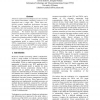Free Online Productivity Tools
i2Speak
i2Symbol
i2OCR
iTex2Img
iWeb2Print
iWeb2Shot
i2Type
iPdf2Split
iPdf2Merge
i2Bopomofo
i2Arabic
i2Style
i2Image
i2PDF
iLatex2Rtf
Sci2ools
143
click to vote
IPPS
2003
IEEE
2003
IEEE
Architectural Frameworks for MPP Systems on a Chip
Advances in fabrication techniques are now enabling new hybrid CPU/FPGA computing resources to be integrated onto a single chip. While these new hybrids promise significant performance increases through the customization of massive gate level parallelism, their full potential will not be reached until a suitable computational framework has been developed. We believe that the computational framework should provide a unified model that brings the FPGA and CPU based components under a common programming model for MPP developers. In this paper, we discuss extending the thread programming model to support hybrid CPU and FPGA computational components to allow systems programmers to access the MPP level of parallelism potential of the FPGA, but within a familiar and understood programming model.
Computational Framework | Distributed And Parallel Computing | FPGA Computational Components | IPPS 2003 | Programming Model |
Related Content
| Added | 04 Jul 2010 |
| Updated | 04 Jul 2010 |
| Type | Conference |
| Year | 2003 |
| Where | IPPS |
| Authors | David L. Andrews, Douglas Niehaus |
Comments (0)

